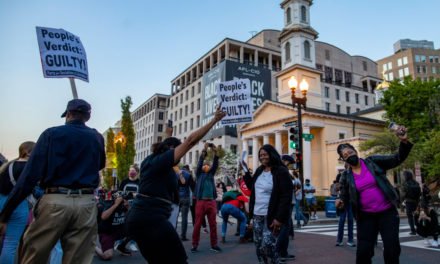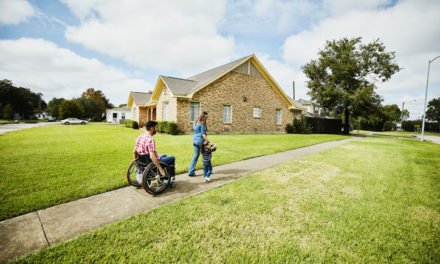
It’s back-to-school time!
Time to pick up new clothes, fresh backpacks, and school supplies for the kids. Time to make sure they kick off the school year focused on academic success. And here in Florida, it’s time to once again infect classrooms with curricula shaped by divisive politics promoting white supremacy, homophobia, and fear.
For those of you living outside of Florida, being a student, parent, or educator here is like being in an alternate universe. It’s like being Spider-Man or The Flash, jumping into an alternate reality. But instead of some mind-bending journey meant to broaden our horizons, this alt-reality is filled with racist and anti-gay education laws. Basically, it’s like traveling back in time to 1823.
In these post-Trump years, especially in MAGA hotbeds like South Carolina, Texas, and Florida, anti-“woke” business and anti-immigrant measures have passed with little to no opposition. Same for education legislation. The result? Banning books, whitewashing history, and bullying educators.
If you’ve been following the circus down here in Florida, you may be familiar with some of this. But here’s what you may not know when it comes to education in the Sunshine State: banned books are a myth, inclusive lesson plans are being taught, and accurate American history is not only valued but celebrated.
With the start of another school year, it’s time for teachers to address their vulnerability by protecting themselves and their students from these hate-filled education statutes. That way, they can teach lessons featuring diverse voices so that students can better understand themselves and the world around them, and to be able to teach without the stress of being punished.
That’s what I did. And that protection came in the form of professional liability insurance, or educator liability insurance. Having it has given me a sense of relief when teaching “controversial” materials, such as reading children’s picture books on African American history, creating lesson plans focused on social issues, and doing arts education activities that promote diversity. (Note: Professional liability insurance is different from general liability insurance in that it adds an extra layer of legal protection specific to a profession, in this case education.)
For some of you, a discussion about getting insurance just to read children’s books to kids might seem weird. It is. But we’re talking about teaching in red state Florida, the epicenter of weird. So, before I go on about the benefits of being insured, let’s talk about banned books for a moment.
Full disclosure: Until recently, I never gave banned books much thought. Of course, I was familiar with the term, having read a few titles over the years, but the topic was insignificant. And that’s because I’d never experienced a book that I wanted being outlawed. That just wasn’t my reality.
To me, banning books sounded like some sick authoritarian joke from the last century. Sure, presidents like Dwight D. Eisenhower and Ronald Reagan banned books, but so did despots like Adolph Hitler and Joseph Stalin. Who would want to follow in the footsteps of those two dictators? The Florida Man running for president in 2024, that’s who.
A year ago, Gov. Ron DeSantis and fellow conservative lawmakers in Tallahassee passed H.B. 1467, known informally as the curriculum transparency bill, prohibiting “pornography” or “inappropriate” books in school libraries, which were already disallowed under law. This had a chilling effect on public school teachers, school librarians, and educators across the state. In the following months, “controversial” books disappeared from school library shelves, were covered up in classrooms, or restricted to students.
And if you ask the Florida governor about this book ban? He’ll lie and call it a hoax. But DeSantis said in a press statement in March 2022 that 23 school districts had removed 175 books. Those books included The Kite Runner by Khaled Hosseini, Beloved by Toni Morrison, and The 1619 Project: Born on the Water by Nikole Hannah-Jones and Renee Watson, a children’s book which tells the story of a young Black girl who learns about her family’s history of slavery and resilience.
These book bans have been met with criticism from free speech advocates, who say they are an attempt to censor important and diverse perspectives in education. They’ve also criticized the bans for disproportionately targeting books by authors of color.
These bans are also part of a larger trend of book censorship in the U.S. In 2022, PEN America recorded more book bans than in any year since 1982. The organization attributes the rise to a number of factors, including the growing influence of extremist conservative groups and the spread of misinformation on social media.
For the record, the American Library Association defines a “ban” as the removal of a book based on a person or group’s objection.
It’s also important to note that book bans in Florida aren’t final. The books that have been banned can still be reinstated if the school districts decide to do so. However, the bans have already had their intended impact — to intimidate teachers, librarians, and advocates from recommending books that may be challenged.
And while educators focus on selecting materials that are acceptable to lawmakers, administrators, and parents, they often neglect to consider the potential for promoting hate, or the need to take protective measures. That’s why getting teacher-specific insurance is so important.
Think of insurance as a shield. It’s a protective solution whose main benefit is protecting educators facing legal action, so understanding the purpose and advantages of this specialized coverage is important.
Like many aspects to teaching, such as maintaining student safety, there are legal risks. Same goes for teaching inclusive lesson plans and accurate American history. Especially in red states like Florida, where extremist conservative lawmakers have politicized education, attacking anything promoting diversity and inclusion, or examining white privilege and white supremacy.
All it takes is one Karen, and you could land in professional and legal hot water teaching in a red state. And that’s why it’s so important for teachers and educators to get insured.
To be honest, I never thought I needed insurance to teach. But I couldn’t ignore DeSantis’ legislative attacks on education, an outgrowth of his larger war against “woke” (translation: war against DEI, CRT, BLM, BIPOC, and LGBTQ+). So, at the suggestion of a mentor, I purchased professional liability insurance.
The sense of relief was immediate. So was the sense of empowerment. It also gave me an idea: read a banned book to students and families in my community. And not just any old banned book. It had to be something relevant to their lives, highlight their history, and be a great read. A few months later, an opportunity presented itself.
That opportunity came in the form of a nationwide festival of STEAM learning events held in April. I was fortunate to participate in one of these events in my community, and decided to collaborate with a local Black-led nonprofit organization focused on the area’s most underserved families with an emphasis on strengthening the mother-daughter bond, overcoming barriers at school, providing basic social skills, and so much more.
Together, we came up with an amazing arts education event centered on the banned book The 1619 Project: Born on the Water. The family-friendly event was held at the organization’s education center, and included a read-aloud of the book, traditional African drum performance, book giveaway, and other arts-ed activities focused on helping students connect with the book’s themes of hope, resilience, and appreciating one’s history. The turnout was great.
And none of it would’ve happened if I didn’t have my educator’s liability insurance. It gave me the confidence to create a lesson plan centered on a banned book. It gave my collaborators a sense of relief that there was a layer of protection to address any concerned students, parents, and attendees. Most importantly, it made me realize that banned books in Florida are a myth.


















